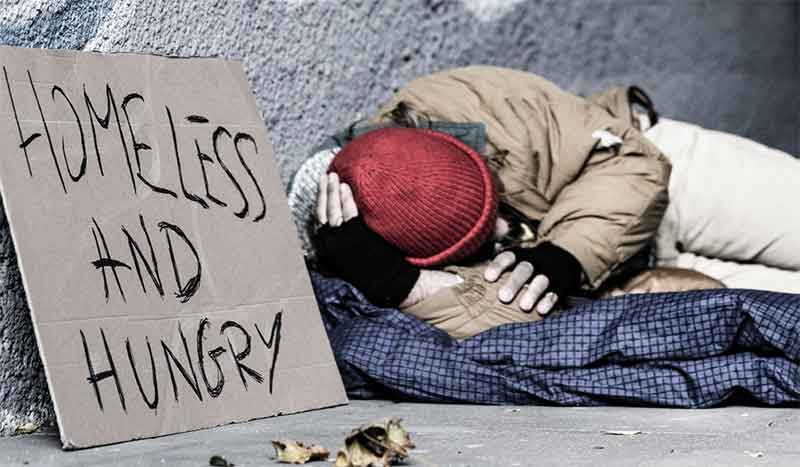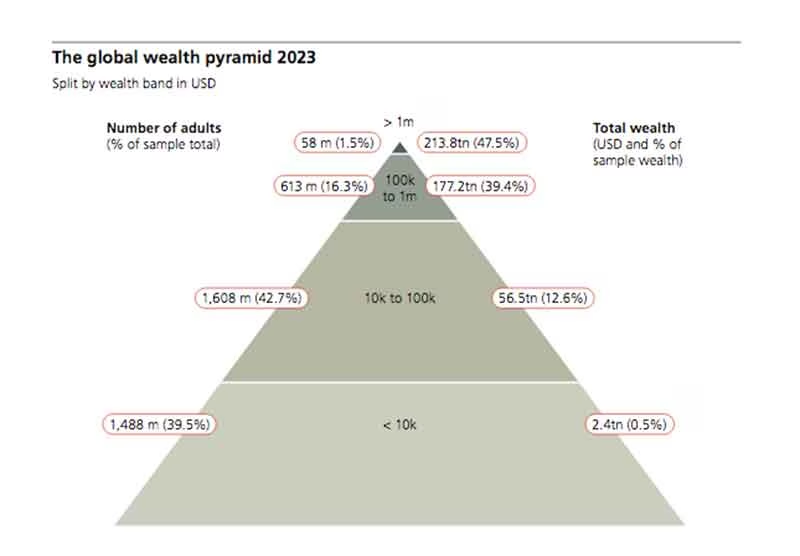
Our world in the year 2025 remains a divided world. Capitalism and its main legitimising ideology of neoliberalism have assured that we continue to live in an unequal world. All of this is not new.
What is new, however, is that Oxfam’s recent Takers not Makers – The Unjust Poverty and Unearned Wealth of Colonialism explains:
- why this is,
- how it came about, and
- who benefits from global inequality.
Among the many reasons why poverty exists, is something that mainstream history books and the media present as being in the past: colonialism.
Yet, colonialism and an extremely unequal world remain inextricably linked. Worse, the impacts of colonialism are still with us in the year 2025.
Today, colonialism has changed. Military conquests and gunboats have been replaced by financial control. Conveniently, an adjacent ideology legitimises global poverty – the poor are lazy.
Financial colonialism – euphemistically also called globalisation – is an ingenuous invention that still extracts a stratospheric amount of money from the Global South.
Its wealth goes to the 1% of the super-rich who live in the Global North. Even today, the neo-colonial looting takes place at a phenomenal rate. A staggering $30 million “per hour” are shipped to the Global North – every hour, day and night.
For example, of the $64.82 trillion – one trillion looks like this: 1,000,000,000,000 – that have been looted from India by the UK over a century of colonialism, $33.8 trillion went to the UK’s richest 10% – the British elite.
To make the 33,800,000,000,000 a bit more imaginable, that money is enough to carpet the entire city of London in £50 notes ($66) – “four times over”. Imagine London’s streets paved with four layers of £50 notes!
While there are plenty of people living in poverty in London and elsewhere, people living in poverty face multiple challenges – from health issue to a daily struggle for survival.
On the other side of the coin, the election of Trump gave a further boost to billionaire fortunes. Trump will make the USA – and perhaps other countries too – more unequal.
The World Bank, for example, found that only 8% of humanity lives in countries that have low inequality.
Following the neoliberal textbook to the letter, four in five countries have cut the share of their budgets going to education, health, and social protection.
Meanwhile, four in five have also cut progressive taxation. This means that the poor pay disproportionally more tax while the rich pay disproportionally less tax. It shifts wealth from the poor and middle class to the rich.
Worse, nine in ten countries have regressed on labour rights and minimum wages – this, too, hits the poor, not the rich.
Employing people below the minimum wages aids, for example, the slavery-like conditions found in Amazon warehouses – where workers are forced to pee in bottles.
Under financial colonialism, low- and middle-income countries – which is the majority – spend 48% of their state budgets on debt repayments.
This is often paid to rich private creditors based in New York and London. It makes some people in these two cities – and elsewhere – even more rich. In other words, our time is the Age of Billionaire Colonialism.
A recent Oxfam report has calculated that 36% of billionaires’ wealth is derived from inheritance – not from investment.
Worse still, this is largely untaxed. Virtually all of this is ideologically legitimised through neoliberalism and propaganda slogans like work hard and you will make it.
Camouflaged through the free market ideology, corporate monopoly power is worsening extreme wealth and inequality – worldwide.
Overall, it is simply impossible to realize the pathology of today’s inequality without understanding the long shadow of the colonial past and how it continues to shape inequality in our present world.
This means, there is historical colonialism and today’s neo-colonialism. The latter is driven by the financial power of the Global North.
In 2025, and almost 60 years after the semi-official “end” of historical colonialism, our global world is still clearly structured in ways that lead to wealth flowing from the Global South to the Global North.
The north gets richer and richer. It is mostly the rich elites that, historically, were the prime instigators, beneficiaries, and exploiters of colonialism.
For example, following the abolition of slavery and its independence from France, Haiti was forced to borrow 150 million francs from France – $21bn in today’s money. It was to reimburse slave owners, and with 80% being paid to the richest enslavers. In other words, it was not the tortured slaves who received compensation but those who tortured and exploited slaves.
This is not a unique development. Between 1970 and 2023, Global South governments paid a staggering US$3.3 trillion in interest to creditors in the Global North. This, too, makes the rich elite even richer.
The elite and the rich have organised themselves in a neoliberal lobbying institution called OECD. Worse, the OECD’s club of the rich continues to dominate global tax policy.
Worryingly, over 70% of all corporate tax abuses are channelled through OECD countries that run the so-called tax havens.
Beyond that, large multinational corporations also dominate global supply chains. They not only exploit cheap labour, but they also continue to extract resources from the Global South.
In a recent report on poverty, the World Bank found that, if current economic growth continues while inequality fails to decline, it will take more than a century to end poverty.
In other words, poverty has been a feature of capitalism since its semi-official starting year of 1760 – well over 250 years ago. So long as capitalism continues, poverty seems to continue as well.
Despite the rather popular ideology that capitalism is the best system to distribute goods and services, in the year 2025, a massive 733 million people still face hunger – worldwide.
That is not only more than the entire population of the EU (450 million), but worse, it is 152 million more people than in 2019.
While capitalism is not the solution to poverty and inequality but the cause, and has no interest in reducing inequality, greater equality actually has many positive benefits.
For example, greater equality is linked to lower levels of corruption and stronger democratic and state institutions.
More equal countries also have higher levels of mutual trust, lower levels of crime, and less appetite for authoritarian governments.
Reducing inequality is not helped by the fact that the share of global wealth is unequally distributed. The Global North, for example, holds 69.3% of all wealth while the Global South holds the other 30.7%.
However, when it comes to the share of population, the number are reversed:
- the Global South has 79.4% of the population while,
- the Global North has just 20.6%.
- In short, the rich are a few while the poor are the many.
This did not happen overnight. In America, European colonisation delivered diseases, brutalities, torture, violence, and exploitation.
This had wiped out 90% of the local people. European colonisers reduced the global population by a staggering 10%.
Meanwhile in Indonesia’s Banda Islands, the Dutch East India Company and its army massacred nearly the entire Bandanese population.
This aided the Dutch killer company to become a giant in controlling and monopolising the spice trade.
Things only got worse. During the 1770s, 40% of Dutch economic growth came from slavery and the slave trade.
The abhorrent trade in human cargo largely furthered the wealth of the rich, and to make it even more zesty, even the Dutch royalty.
The Dutch were no exception. Several kings and queens in England supported – and also profited – from slavery. Huge riches were extracted. This legacy lives on in the wealth of some of the richest people today.
Yet, all of this is still not enough. Many of today’s largest banks – Barclays, HSBC, and Lloyds and major accounting firms such as Deloitte and Price Waterhouse Coopers (PwC) – furthered their profits and wealth generated from slavery.
JP Morgan Chase, NatWest, and ABN AMRO Bank all gained indirect financial paybacks from slavery. Some cashed in – some died along the way.
All of this is by no means in the past. Another even more interesting legacy of all this is that today, in 94 countries, someone who is enslaving another human being cannot be prosecuted. In other words, slavery is still legal.
In one of the prime destinations for slave, this, too, still lingers on. It took Haiti a whopping 122 years to repay $21bn – in today’s money – of French colonial debt.
It was put onto Haiti by France and collected by France to the last penny. Haiti was forced to pay a bitter price for freedom.
Yet, neither colonialism nor neo-colonialism nor corporate criminality stopped there. Corruption and bribery remain inherent features of corporate capitalism. Just on example – that of Glencore – can illuminated this dark corner of corporate capitalism.
The Anglo-Swiss Glencore company is one of the world’s biggest commodity traders – valued at €57.7bn or $65bn = $65.000.000.000.
Glencore runs mining in Africa – especially in the civil-war-torn Democratic Republic of the Congo (DRC). Of course, Glencore has nothing to do with the daily brutalities and killings meted out in the DRC.
In 2022, Glencore recorded a rather handsome profit of $34.11bn – a $12.8bn increase from 2021. In other words, Glencore makes big bucks – others die.
In the same year, the UK government fined Glencore £281m [$373,000,000] for engaging in bribery in Africa.
In other words, Glencore was fined a whopping 1% of its profits. It is like getting a parking ticket for 2½ cents.
Facing a 1% fine, Glencore’s bosses must have been trembling with fear. For the standard CEO, such a microscopic fine is filed under: “the cost of doing business”.
In the following year – in 2023 – a US federal court issued a fine for corporate criminality to the very same company, Glencore, to $700m for bribery in Africa and South America – a 2% fine. With Mickey Mouse fines like these, corporate neo-colonialism continues to do well.
What all of this ends up doing has been outlined by none other than Swiss investment bank UBS. In its recent wealth report, UBS shows what it calls the wealth pyramid – the word “pyramid” is used to insinuate “this is a given” and “it can’t be changed”. Yet, it still illustrates global inequality:

UBS’s picture shows what our world looks like today. At the top, we have 58 million people holding 47.5% of all wealth. Those are the super-rich.
Below that are 613 million holding 39.4% of all wealth. These are the rich. Below the rich, are 1.6 billion adults who still manage to live decent lives. They hold 12.65% of the global wealth.
At the bottom are 1.5 billion adults who are poor. They hold just 0.5% of the global wealth.
In other words, 3.1 billion adults share 13% of the global wealth – these are the poor. Meanwhile, 670 million adults hold 87% of the global wealth.
Put together, a small group of people have everything while the vast majority of people have next to nothing. This is what inequality means.
It is our world today – shaped by colonialism, neo-colonialism, capitalism, inequality, poverty, and exploitation.
Subscribe to Our Newsletter
Get the latest CounterCurrents updates delivered straight to your inbox.
Born close to Germany’s Castle Frankenstein, Thomas Klikauer writes on managerialism, has over 1,000 publications, and a recent book on Alternative für Deutschland: The AfD.















































